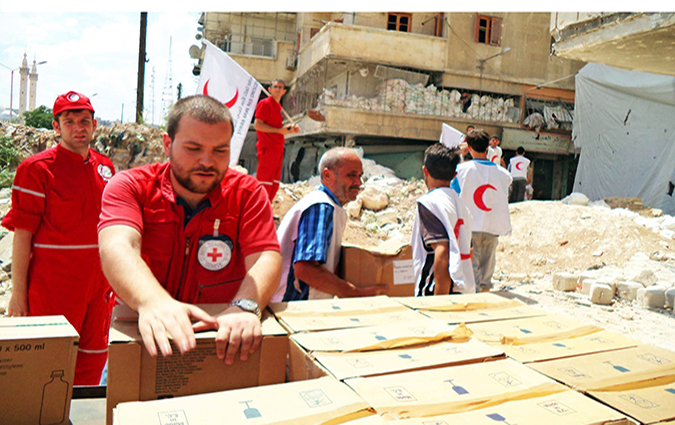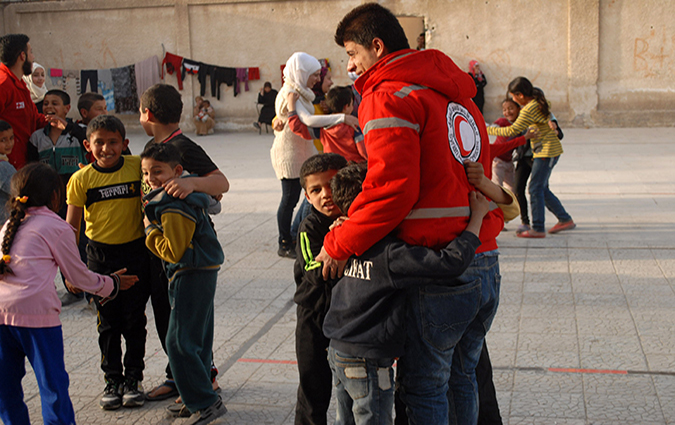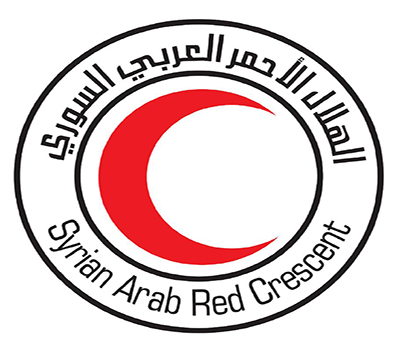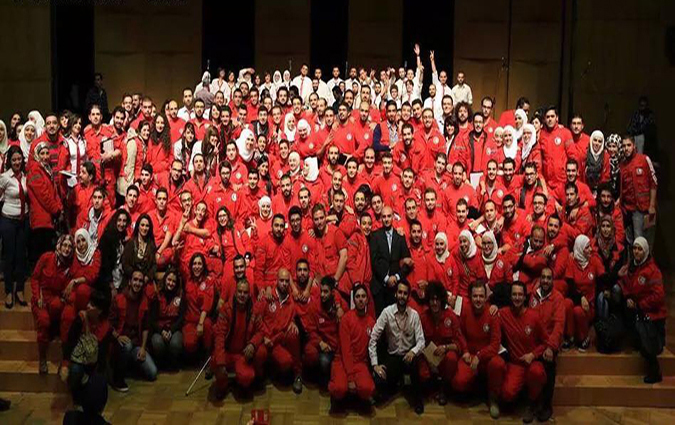Red Crescent Volunteers: Killing and Kidnapping Met with International Silence

Emblems denoting international protection carried by the volunteers of the Syrian Red Crescent could not, in practice, protect the volunteers against the four years of ongoing conflict. The Syrian regime and armed militias continue to arrest and kidnap many of the Red Crescent volunteers, who face charges of supporting terrorism because of humanitarian and relief activities.
A former volunteer in the Damascus branch of the Red Crescent, who was detained for two months in 2013, says in his interview with Suwar Magazine, "I was accused of terrorism because of my help in providing food aid to the displaced people of the city of Dariya. I was treated very badly, compared with my colleagues. Throughout the two months, they regularly tortured me beginning with the words ‘You really send food and medicine to the terrorists?’ ”

Into the detention trap
With the increasing complexity of the political situation in Syria, the crisis even reached the humanitarian corridors of the Red Crescent. Deir al-Zor branch volunteers operate under difficult conditions in a small space of the city controlled by the regime, the least of which can be described as harsh, and the suffering has only increased with the blockade imposed by ISIS.
Many citizens of the city who spoke with the magazine confirmed that branch leadership, who are known for their endorsement of the regime, have harassed volunteers and are hostile toward the people who have spoken against them. This occurs in the absence of media coverage of the arrests that affect the branch volunteers. This absence is due to the geographical dimension and the high security risks in eastern Syria.

Sources close to the branch tell Suwar Magazine, "Two years ago checkpoint security and shabiha[1] arrested two volunteers, Mudlij Almudallja and Ibrahim Hamed, and both disappeared from that moment. Their parents paid ransom to the regime's brokers and security apparatus, yet it did not do any good to in revealing their fate."
The source continues by saying, "The head of the Red Crescent branch is responsible for the kidnapping. He is known to be vehemently pro-regime, and has high-level relations with the leaders of security agencies." He adds, "Ibrahim and Mudlij were two of the most powerful voices calling for the administration to provide assistance to areas under the control of the opposition. The administration opposes it, which has led to Ibrahim and Mudlij being targeted by security agencies." The source added, "No one knows the real reason why the branch and its management are still in place, despite the consensus of the community about the branch’s corruption. The management is stealing aid and selling it in the market and distributing it to shabiha in town."
Syria - the most dangerous for volunteers
The International Committee of the Red Cross (ICRC) has documented that, as of last April, 42 volunteers from the Syrian Arab Red Crescent, and eight volunteers from the Palestinian Red Crescent in Syria, were killed while carrying out their duties in areas outside the regime's authority. All these incidents resulted from warplanes or from a variety of weapons, all belonging to the regime. Even so, the ICRC, through its main office in Damascus, did not take any real action to pressure the regime to stop targeting its cadres in Syria. As is usual, a press statement was issued condemning the killing of the volunteers while carrying out their work, calling for all parties to the conflict to stop targeting humanitarian workers, despite the fact that the deadly cause is clear to all, but the organization avoids naming it.
The humanitarian crisis in Syria has reached record numbers of human casualties among the cadres of the ICRC, even compared with countries that have seen conflict and destruction similar to Syria, such as Yemen and Libya. As documented by international human rights organizations, the casualties of the Syrian regime surpass those of the former Libyan regime in terms of targeting human cadres of the ICRC.
Silence of the organization

Despite the repeated arrests which have affected volunteers since 2011, the Syrian Arab Red Crescent has not issued an official statement demanding the release of any of the detainees, nor have they made any public efforts for their release.
A volunteer from the Hama branch tells the magazine, "Some branch officials were trying to mediate with the security agencies to release some colleagues, and often nobody listened to their demands, the security [apparatus] is the supreme authority in the province."
He continues, “Branch officials may face charges of abandoning their staff who were detained, which is kind of true, but the reality has its own rules where most departments are trying to create a state of balance to achieve the larger goal of providing aid to the Syrians in need."
Another volunteer, Obeida N., says, "There are more effective ways to protect the volunteers that are not being used by the leadership of the Red Crescent, knowing that in many African countries the ICRC withdrew and stopped their activities after workers were exposed to situations of violence, I really do not know why the ICRC does not issue an order for the Red Crescent to withdraw."
On the other hand, Amnesty International has recorded several appeals for the release of the volunteers who have been detained previously, such as Mohammed Atfeh, who was arrested in April, 2013.
Lawyer Karam Aerbini says, "There are special laws governing the work of international organizations; ICRC and the International Federation of Red Crescent and Red Cross are a part of it. Maybe there is silence from the organization's leadership in Syria, fearing the wrath of the regime, but why the silence in the corridors of the international organization in Switzerland? Why are they content to issue a statement denouncing the killing and detention of their volunteers? The principle of protection is the most important in the organization, and securing the personal security and safety are among the first lessons a volunteer receives in Syria."
Negative repercussions
The absence of real protection for the Red Crescent volunteers has resulted in the avoidance of young people getting involved with the organization in the last two years, in spite of their desire to contribute to humanitarian activities.

Sarah, a student at the Faculty of Dentistry at the University of Damascus, a former volunteer with the Red Crescent, says, "With the escalation of violence in Syria, I took the initiative to volunteer with the Red Crescent, and have participated in several courses in first aid, but the arrest of another volunteer who had been working with me in the ambulance team led my parents to push me to leave my work for fear of exposure to harm, so I decided to stop working."
Another volunteer, who requested anonymity for security reasons, said to Suwar Magazine, "I am fully aware that we are being targeted by the regime, and this targeting is intentional and deliberate and not in error. Even so, I think that humanitarian action is worth the risk; the people of my country need help, and every Syrian should be capable of helping them. And shouldn’t this especially be true for the volunteers in an organization devoted to helping others in all circumstances and conditions?”



